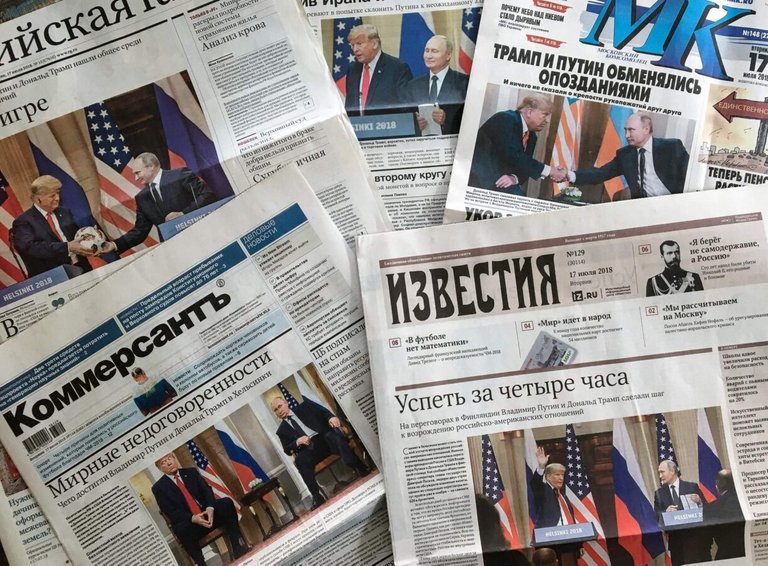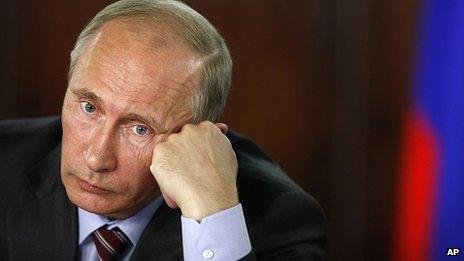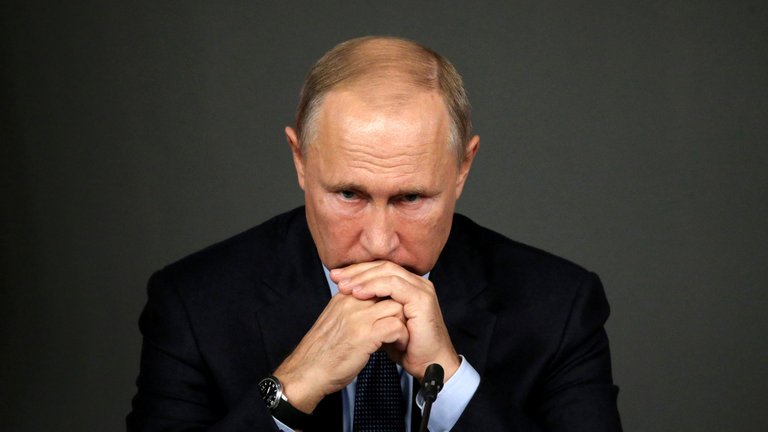How did Russia become confused because of the reckless behavior?
In a televised speech, at the dawn of last February 24, Russian President Vladimir Putin announced a "military operation" in the Donbass region, eastern Ukraine, considering that "confrontation between Russia and nationalist forces in Ukraine is inevitable," before indicating that Russia does not plan to occupy Ukrainian territory.
However, with the start of the operation, it became clear that the Kremlin's goals are far beyond the region, especially as the Russian bombing quickly extended to the Ukrainian capital, Kyiv, and the rest of the major cities.
In parallel, it became clear that none of the Kremlin's goals or estimates were correct. Today, half a year into the war, Russia is backfiring in its invasion of Ukraine, despite the latter losing about 20 percent of its territory.
With the failure of Russian assessments to win a quick war by controlling the capital, Kyiv, and removing President Volodymyr Zelensky from power in a swift and precise process, the latter was able to turn the equations and change European and American positions towards increasingly supporting his country politically, militarily and economically, in return for Moscow's political and economic isolation.
And the situation rolled into a major confrontation, in Ukraine, between Russia, which is seeking to establish new global equations in which it is an essential party, after decades of Western marginalization and being viewed as a losing party in the Cold War (1947-1991), and between the United States, the European Union and other countries pushed by the Russian war. To rapprochement once again, in rejection of attempts to change the political map in the world according to the whims and desires of decision-makers in Moscow.
The failures inflicted on the Russian army revealed that the Russian military capabilities were greatly exaggerated
Despite the assertion of the Russian political and military leaders that the "special military operation" is going according to plan, the events of the last six months revealed drastic changes in the tactics of the Russian army.
It also showed fluctuations in the main battlefronts, through the decline in focus on the capital, Kyiv, with the intensification of work on eastern and southern Ukraine, without achieving the first primary goal of the war, which is "protecting the Donbass region."
After fierce battles, Russia and Ukrainian separatists managed to control Luhansk, but the fronts in Donetsk have been in a state of stalemate since the end of last June, with the Ukrainian army preventing the fall of the cities of Bakhmut, Slaviansk and Kramatorsk, and retaining about 40 percent of the area of Donetsk region with its administrative borders in 2014. .
Since last May, it has become clear that the "special operation" has turned into a war of military, political and economic attrition between Russia and the "collective West", with several indications that everything that happened for half a year is nothing more than a prelude to "bone-breaking" battles, the end of which defines features. A radically different world than it was before February 24.

Wrong calculations and counterproductive results
Militarily, the failures inflicted on the Russian army in the first phase of the war, the stalemate two months ago in the second phase, and the emergence of major deficiencies in the logistical and operational fields, revealed that the Russian military capabilities were greatly exaggerated, and also showed that the Russian army is not ready to fight an all-out war. And long on the ground, despite Russia's formidable capabilities in the field of ballistic missiles, including the hypersonic missiles that President Vladimir Putin has so much boasted about.
The war also revealed a weakness in conventional weapons, despite the massive armament programs since the Russian war on Georgia in 2008, and that fighting a real war with an enemy that possesses weapons is completely different from the “weapons testing fields” in Syria since 2015.
While it is not possible to ascertain from an impartial source the extent of Russian casualties, the US Assistant Secretary of Defense for Personnel Affairs Colin Kahl said, during a media briefing, on August 8, that “Russia has lost between 70 and 80,000 soldiers since the outbreak of the war.” "This number includes the dead and wounded," he explained.
The war also revealed the deterioration of the morale of the soldiers, and the lack of conviction in fighting the Ukrainians, which prompted the Russian leadership to use the Chechen forces, and public talk about the participation of "Wagner" mercenaries in the war.
On the other hand, the stubborn resistance of the Ukrainians proved that Russia's influence on the Ukrainian street and on Russian speakers is much less than what was being promoted by the Kremlin's propaganda.
Although Russia was able to control two-thirds of the Zaporizhia Province, most of the territory of Kherson, and about a quarter of the territory of the Kharkiv Province, which gave it control over a large part of the “Novorussian” regions (which the Russian thinker Alexander Dugin called for its application), which also includes the Donbass and Odessa regions. In Ukraine, the borders of the “Russian world” have narrowed, and more Ukrainians see Russia as an “enemy,” weakening Russian soft power through the use of church and language.
Although Russia has accelerated the procedures for merging the occupied areas in Ukraine with the Russian territory by granting citizenship, appointing civilian military leaders loyal to it, moving to the Russian health and education systems, imposing car plates and Russian driving certificates, dealing in rubles, using the Internet and others, but this does not rule out The possibility of a popular opposition movement, especially in the southern regions.
It is also not excluded that he will move to the Crimea, which Russia annexed by force in 2014, and the border areas with Russia.
Half a year after the war, Russia had backfired. The war on Ukraine helped bring NATO out of the "clinical death" that it had experienced during the last decade, and reached a point that threatened its collapse during the term of former US President Donald Trump.
The submission of Sweden and Finland membership application to join the alliance one of the most prominent repercussions of the war on the strategic level. Months after Russia presented a paper demanding security guarantees to the United States and NATO in mid-December, specifically the call for the alliance to retreat to the borders it was in before 1997 (that is, when the alliance included 19 countries instead of 30 currently), the war pushed Russian on Ukraine, the Scandinavian countries to abandon the policy of neutrality.
Stockholm and Helsinki saw that the only guarantee of their security was joining the Atlantic, and thus Russia's use of its military force provided the "kiss of life" to the alliance, and pumped new blood into its veins by adding a qualitative addition in northern Europe, which would cause an imbalance in the balance of power in the Baltic and Arctic Ocean regions in favor of the alliance. The Atlantic, with the land border between Russia and NATO doubling to about 2,600 km.
Assuming Russia's success in controlling the eastern and southern regions of Ukraine up to the capital, Kyiv, to prevent Ukraine from turning into a base for the Atlantic to target Russia according to the declared goals of the war, all areas of northwestern Russia are now exposed to NATO after the end of Finland's accession procedures.
Saint Petersburg, the capital of the Russian north, is within the range of NATO missiles if Finland agrees to deploy them on its territory. It is known that Putin stressed last year the inadmissibility of building bases for NATO and deploying missiles in Ukraine, because they could reach Moscow in five minutes, if they were launched from Kharkiv or Kyiv.
With Finland and Sweden joining the Atlantic, the Baltic Sea is turned into a closed lake for the alliance with two small enclaves in the Leningrad and Kaliningrad provinces. In the Arctic, Russia will be forced to strengthen its military presence and allocate huge budgets for this purpose.
Another important repercussion is that the war has created a new geopolitical environment that has strongly re-established the Cold War atmosphere, and will launch an arms race between the West and Russia whose final outcome will not be in Russia’s favor. Expensive costs.
In this regard, Russia appears to be the weakest party with an economy that does not exceed 2 percent of the size of the global economy, and its excessive dependence on energy resources, and perhaps the worst is the technical backwardness that will deepen with the Western sanctions imposed on the background of the war.

Open War
Many argue that the war has turned into a war between Russia and the West on Ukrainian soil, and the war may have become closer to a third world war, with controls maintained by the Russian and Western sides so far, to prevent it from turning into comprehensive confrontations in which nuclear weapons may be used.
Fears of an uneasy situation are increasing as the United States and Europe continue to support Ukraine in order to deprive Russia of a strategic victory that would enable it to change the political map in Europe and impose new security equations. This portends a long war akin to a "finger-biting" operation in which each side uses all its political, economic and military capabilities.
It is certain that the continuation of the war for the coming months increases the uncertainty about the possibility of Russia winning, especially that Western countries have drawn up plans to increase their production of modern weapons intended for Ukraine, and to increase the training of Ukrainians to use them, according to the summary of a meeting held this month in the Danish capital, Copenhagen, in the presence of Defense ministers of 26 countries. The meeting also aimed to ensure that there is no shortage of weapons stocks, and to cooperate in the development of modern weapons.
The statements of officials from the Russian and Ukrainian sides indicate that the chances of reaching a political settlement in the coming months will diminish. The way in which the Kremlin conducted the war politically closed the door on the possibility of Russia reaping political fruits by imposing a settlement in accordance with the goals set by the beginning of the war.
On the other hand, the Russian side cannot enter into serious negotiations before achieving progress on the ground, especially controlling the entire Donbass region, the main objective of the current war.

Russia has always had the upper hand. Their goals are still well on the way to completion:
Its estimated Ukraine started with 38 Mobile brigades and 9 artillery. Its taken 3 brigades of losses a month, on average, so 21, in the failed Kherson offensive it lost 4, in the East it lost 2 more, that's a total of 27 brigades by conservative figures. This is known from their own report.
https://ecency.com/hive-122315/@baah/bombshell-leaked-ukrainian-military-reports
https://www.moonofalabama.org/2022/08/ukraine-sitrep-casualties-leak-ukraine-admits-russian-breakthrough-southern-front-paralysis.html
More
https://www.rt.com/news/557262-ukraine-daily-military-casualties/
https://www.oryxspioenkop.com/2022/02/attack-on-europe-documenting-ukrainian.html
Considering that Donbass is 80% or more secured and they hold two other regions, and a buffer zone in Kharkov, and with all the Ukrainian troops out from their defensive positions and overstretched supply lines, and no electricity and no water, it's well on the way to liberation and neutrality being complete. If we factor in that there's no more military aid coming as European partners are bone dry and sent everything to Ukraine on promises from the US that it will give them newer equipment, promises it still hasn't delivered on, and that Europe was banking on Ukrainian electricity after it failed to secure gas from Canada, America, or Qatar, and the people are revolting, while Russian economy is steady growing with record profits and a currency that is the top performer in the world while enjoying a technological advancement over all other countries in the world in weapons technology, Russia will mop the floor with the Nazi.
Russian Anti-Satellite NUDOL Missile Is Frightening - Will Blow Any Satellite In Seconds
https://www.bitchute.com/video/XxigcNKnpbeH/
Only country to have a successful weapons test with such a system.
Take your pick.
https://www.bitchute.com/search/?query=russia%20hypersonic&kind=video&sort=new
Here's what the truth is from the mouth of the Ukrop themselves, via West Muppet Propaganda WaPo
What Ukraine Regime got was a Pyrrhic Victory at best in the East, all the territory without any destroyed Russians, and some photos of "captured" equipment, photographs don't win war:
https://www.nakedcapitalism.com/2022/09/fog-of-war-military-and-economic.html
This video breaks it down point by point:
All sourced.
(Peakd and hive.blog blocks you from seeing my images but not ecency.com)
Dear @totyahmed731993, we need your help!
The Hivebuzz proposal already got important support from the community. However, it lost its funding a few days ago and only needs a bit more support to get funded again.
May we ask you to support it so our team can continue its work?
You can do it on Peakd, ecency, Hive.blog or using HiveSigner.
https://peakd.com/me/proposals/199
Your support will be really appreciated.
Thank you!